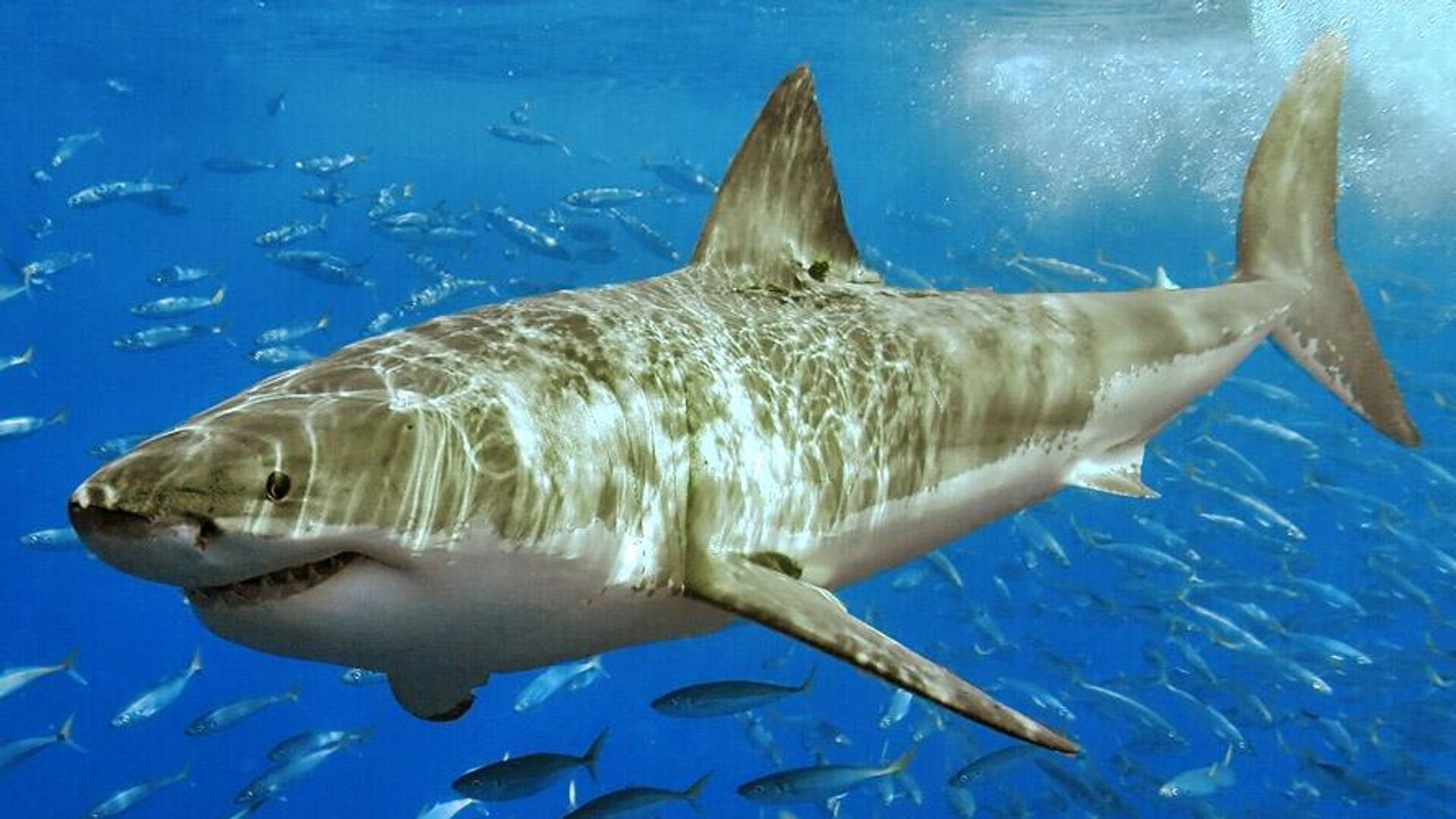https://en.sputniknews.africa/20230914/eastward-shift-of-white-sharks-reportedly-increases-need-to-boost-safety-measures-in-south-africa-1062115688.html
Great White Sharks' Eastward Shift Prompts Safety Measures in South Africa
Great White Sharks' Eastward Shift Prompts Safety Measures in South Africa
Sputnik Africa
The great white shark is one of the top marine predators, which can be found in the coastal surface waters of all the major oceans. According to the South... 14.09.2023, Sputnik Africa
2023-09-14T18:19+0200
2023-09-14T18:19+0200
2023-09-14T19:23+0200
south africa
sub-saharan africa
cape town
research
animals
southern africa
https://cdn1.img.sputniknews.africa/img/07e7/09/0e/1062115834_0:9:890:510_1920x0_80_0_0_722106647ab9d7d09545b5053f084b87.jpg
Enhancing beach safety is necessary in South Africa as great white sharks are moving eastward, media has reported.A recent study published in the Ecological Indicators journal on white shark populations off the South African coast, along with a new shark-spotting program, presented proof that the predators generally left the Western Cape region and headed east.The evidence provided by the researchers included the number of great whites caught by shore anglers, shark spotting and entanglements of the sharks in nets off some of the country’s eastern beaches.For instance, in Algoa Bay, about 650 kilometers east of Cape Town, coastal anglers caught 59 great white sharks in 2019, while in 2013 only six of the predators were captured.According to the media, Sarah Waries, the chief executive officer of Shark Spotters, which late last year expanded its operations from Cape Town on the south-west to the beach resort of Plettenberg Bay some 450 kilometers to the east, also highlighted that "there’s more shark activity from Plett eastward."As for the reasons behind this eastward shift, the authors of the study assume that the great white sharks could have moved due to a pair of orcas that began feeding on them in False Bay off Cape Town or due to the overfishing of smaller species that sharks feed on.Although the dislocation of the sharks' population has changed, its number remained stable since they were declared a protected species in 1991, the researchers stated.In September 2022, the second fatal shark attack in three months was registered in Plettenberg Bay, media reported. The local municipality reportedly noted that this shark activity in the region "was very unusual when compared with previous years."
south africa
cape town
southern africa
Sputnik Africa
feedback@sputniknews.com
+74956456601
MIA „Rossiya Segodnya“
2023
Rasina Musallimova
https://cdn1.img.sputniknews.africa/img/07e7/0a/17/1063019139_0:0:646:646_100x100_80_0_0_348c74b69cf86748a53875f8148a2f85.jpg
Rasina Musallimova
https://cdn1.img.sputniknews.africa/img/07e7/0a/17/1063019139_0:0:646:646_100x100_80_0_0_348c74b69cf86748a53875f8148a2f85.jpg
News
en_EN
Sputnik Africa
feedback@sputniknews.com
+74956456601
MIA „Rossiya Segodnya“
Sputnik Africa
feedback@sputniknews.com
+74956456601
MIA „Rossiya Segodnya“
Rasina Musallimova
https://cdn1.img.sputniknews.africa/img/07e7/0a/17/1063019139_0:0:646:646_100x100_80_0_0_348c74b69cf86748a53875f8148a2f85.jpg
south africa, cape town, research, animals, southern africa
south africa, cape town, research, animals, southern africa
Great White Sharks' Eastward Shift Prompts Safety Measures in South Africa
18:19 14.09.2023 (Updated: 19:23 14.09.2023) The great white shark is one of the top marine predators, which can be found in the coastal surface waters of all the major oceans. According to the South African Journal of Wildlife Research, in 2006, the largest population of these sharks was registered in the waters around Dyer Island in the Western Cape Province of South Africa.
Enhancing beach safety is necessary in South Africa as great white sharks are moving eastward, media has reported.
A
recent study published in the Ecological Indicators journal on white shark populations off the South African coast, along with a new shark-spotting program, presented proof that the predators generally left the Western Cape region and headed east.
The evidence provided by the researchers included the number of great whites caught by shore anglers, shark spotting and entanglements of the sharks in nets off some of the country’s eastern beaches.
For instance, in Algoa Bay, about 650 kilometers east of Cape Town, coastal
anglers caught 59 great white sharks in 2019, while in 2013 only six of the predators were captured.
"Changing shark movements could also influence beach safety," the scientists stressed in a summary of the study, noting, "Increased signage, temporary beach closures, or improved education about shark behavior might be needed."
According to the media, Sarah Waries, the chief executive officer of Shark Spotters, which late last year expanded its operations from Cape Town on the south-west to the beach resort of Plettenberg Bay some 450 kilometers to the east, also highlighted that "there’s more shark activity from Plett eastward."
"Other areas must look at shark safety," the official added, according to the outlet.
As for the reasons behind this eastward shift, the authors of the study assume that the great white sharks
could have moved due to a pair of orcas that began feeding on them in False Bay off Cape Town or due to the overfishing of smaller species that sharks feed on.
Although the dislocation of the sharks' population has changed, its number remained stable since they were declared a
protected species in 1991, the researchers stated.
In September 2022, the second fatal shark attack in three months was registered in Plettenberg Bay, media reported. The local municipality reportedly noted that this shark activity in the region "was very unusual when compared with previous years."


